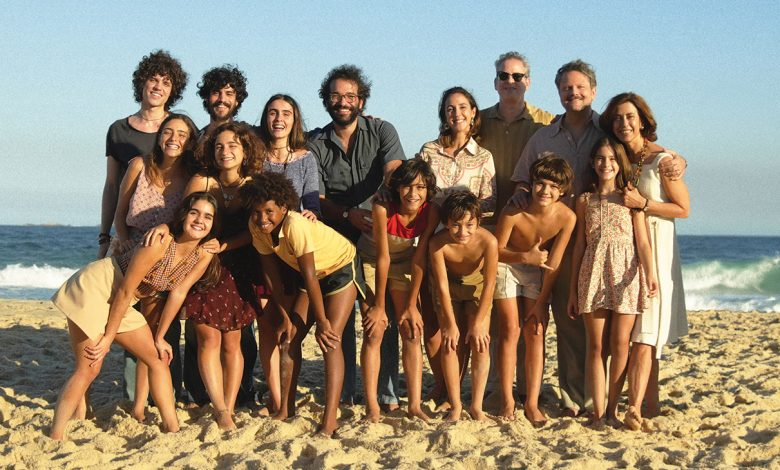Walter Salles’ ‘I’m Still Here’ and Its Impact

For an impossibly long time, we luxuriate in a family living their best lives in Rio.
We know what’s coming in this haunted movie, and yet the 1970s nirvana washes over us: mother and father throwing spontaneous dance parties as the children and neighbors join in, a family heading out for an endless-summer kind of day at the beach.
By the time the unthinkable happens more than 30 minutes in, we are so sunburnt by the tropical glow we have to blink to be certain of what we saw. Did that really happen? Was the father really taken in for “questioning” by Brazil’s military dictatorship, never to be seen again?
Such is the low-key wallop of Walter Salles‘ I’m Still Here. Inspired by real events and the director’s own childhood visitations at the home of the family portrayed in the movie (the father is the real-life anti-dictatorial congressman Rubens Paiva), the film is a lived-in tale that still lays waste to our emotions. I’m Still Here (the deliberately ambiguous title could be referring to multiple characters) tells the specific but hardly uncommon story of a victim of the 21-year period when a far-right military junta seized control in Brazil and began making its opponents disappear in a spree of repression and violence.
When Sony Pictures Classics opens the Portuguese-language movie next month, it will bring home to many Americans a story they don’t know, using the most effective of political cinema’s tools — a vital and lovable family.
“Our film is only political because it’s about the human spirit,” Salles tells THR a day after the movie’s U.S. premiere in October at the New York Film Festival, where the tear-filled (but still joyous) reception was like few this longtime NYFF-goer has ever seen, “and what that family goes through from an existential standpoint — how it can reinvent itself and have that reinvention relayed from generation to generation.”
One of Salles’ most effective techniques is exactly this — his decision late in the film to jump ahead a quarter century to the post-dictatorship period of the mid-1990s, when son Marcelo has written a best-selling memoir about the family, while mother Eunice (Fernanda Torres) over the decades has reinvented herself as a lawyer to fight for information and justice for her likely dead husband.
And then the film jumps forward again, showing in a subtly devastating dinner scene set in the mid-2010s how the family, now with grandchildren, has both come through the crucible and been irrevocably changed by it. (End-of-film Eunice is played by 95-year-old Fernanda Montenegro, Torres’ real-life mother, Brazilian national treasure and, Salles devotees will recall, star of his 1998 breakout Central Station.)
Salles had the roots of I’m Still Here planted in him as a teenager.
“When I was 15, I returned to Brazil after five years of being away. I quickly realized the country I came back to was very different from the one I left,” he says, alluding to a year, 1971, that overlaps with much of the film’s time frame and one in which, as a young man friendly with the Paiva kids, he would often spend time in the home shown onscreen.
“People didn’t speak freely like they used to. Even the ability to mingle in public spaces like the beach, which is so characteristic of Rio, suddenly didn’t occur. The geography of the city had changed.” He didn’t know it at the time, but he was filing away these memories for a future piece of cinema.
The movie would take a long time to percolate. Working off Marcelo’s memoir and ultimately a script by Murilo Hauser and Heitor Lorega, Salles spent decades letting his ideas and style gel. The documentary elements of his 1995 debut, Foreign Land; the feminist emotional core of Central Station; the rugged South American terrain of The Motorcycle Diaries — all fed into what he would go on to do here. That last one especially.
“It’s not an accident I made all these road movies first,” Salles says, also referring to his 2012 Garrett Hedlund-Kristen Stewart adaptation of On the Road. “Those were characters drifting along, trying something in uncharted terrain. Now we’re talking about an inner voyage.”
Salles talks to his actors in a tense scene involving the military dictatorship in I’m Still Here, his new fact-based drama that’s at once personal and political. Courtesy of Sony Pictures Classics
That journey is Eunice’s in particular. The film has an undeniably feminist leitmotif; Eunice is played not as a victim but not as an empty hero, either. Instead, while still grieving, she assuredly moves her family from Rio so she can train as a lawyer and work the system from within. “To jump on the barricades was not an option for her,” Salles says. “The option was to go through institutional channels. Belief in those channels was the subversive act.”
Torres says her character follows a clear evolution: “She starts the movie like a housewife, serving coffee and taking care of children. And suddenly, as the film develops, she becomes Achilles, she becomes Odysseus, she becomes the one in charge of the Trojan War. She’s like Antigone, but with five children.”
But this heroism, Torres notes, takes a quieter form than it might in a mythical story. “This is not a woman in a fight at the front; she doesn’t do it the standard way. She does it in a silent way, a powerful way. She just believes in justice and democracy. She just believes in having a spine. She doesn’t do it because of feminism, but she’s totally a feminist.”
That vibe of stillness abides in the film too, emotions conveyed with subtle cues and a refreshing absence of melodrama. “It’s so fucking real, and I think we stay true to that,” Torres says. “We don’t do a crying scene. We don’t do a screaming scene.”
Even the central moment of Rubens being taken away is played in an unexpected key. “I told Walter I wanted to do it smiling,” says Selton Mello, who plays Rubens. “That’s what I believed he would do.”
These small character details, Salles believes, aid the larger story.
“We have a family that had to reinvent itself and at the same time a whole country that had to reinvent itself,” he says of the action in the movie, which will have a qualifying release in December as it makes a bid for the international film Oscar. “I’m always drawn to stories where the journey of the character and the journey of the country somehow mingle. So, specific, but the specific becomes the collective.”
And the collective means something beyond the film, Salles believes. “This has only reinforced my faith in literature and cinema as very powerful tools against oppression,” he says. “To actually talk about the reflections of who we were sometimes allows you to decide much better who we want to be.”
Brazil’s military dictatorship officially ended in 1985. It would take many years for the new government to acknowledge the sins of its predecessors. And in case anyone thinks its suppressions are the stuff of the past, the emergence of far-right leaders around the Western world in the past few years quickly quells the fantasy.
Even Brazil has been unable to leave the phenomenon to history — the movie’s opening a few weeks ago prompted calls for a boycott from far-right political groups.
“When I was 18, we talked about utopia all the time. My son is 18, and his generation talks about dystopia,” Salles says. “Before getting to the Renaissance, we had to go through the Middle Ages. We are somehow in a similar situation, trying to reach the humanism at the end of all this.”
Source: Hollywoodreporter
Related Posts
- Roundball Rocked: With NBA Return Looming, NBC Purges Scripted Roster
- SoundCloud Says It “Has Never Used Artist Content to Train AI Models” After Backlash on Terms of Service Change
- Fox News’ Camryn Kinsey Is “Doing Well” After Fainting on Live TV
- Kerry Washington and Jahleel Kamera in 'Shadow Force.'
Courtesy of Lionsgate
…
- This Alternative Artist Landed a Top-20 Chart Debut With an Album Made Almost Entirely on His Phone





